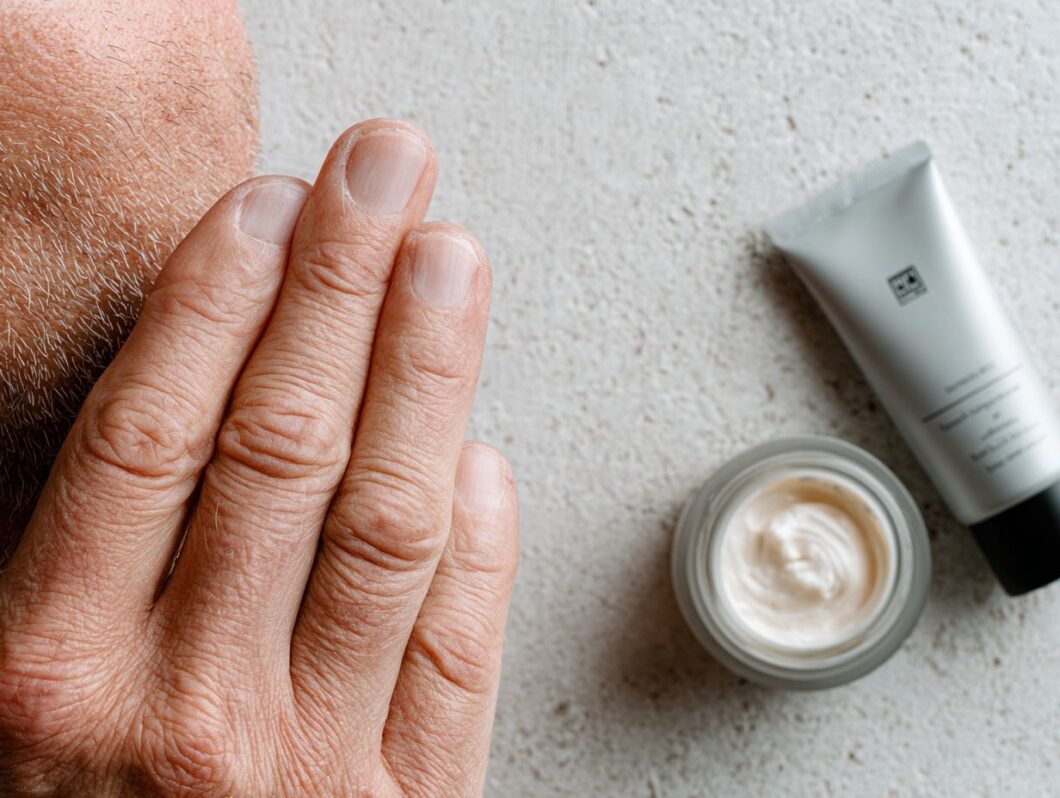Is your skin feeling dry, irritated, or overly sensitive? These could be signs of a damaged skin barrier, a crucial component of healthy skin and overall skin health. According to Cleveland Clinic’s Melissa Piliang, MD, understanding your skin barrier is essential for effective skin care. In this article, we’ll explore how to identify a compromised skin barrier and provide actionable steps to restore and maintain its protective function, ensuring your skin stays healthy and resilient. Dermatologists tips and gentle skin care can aid significantly in this process.
Key Takeaways:
Understanding the Skin Barrier
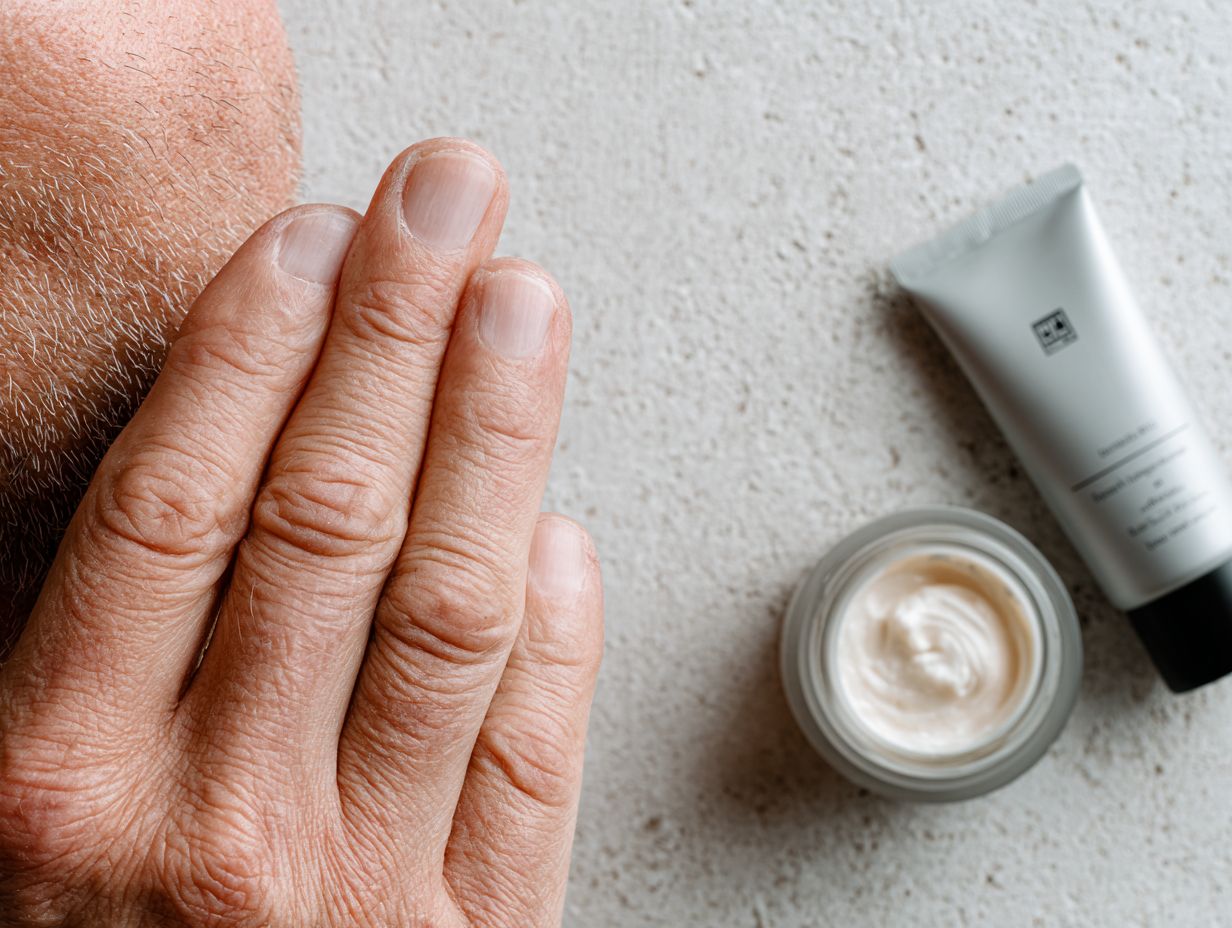
The skin barrier, including structures such as the epidermis, dermis, and stratum corneum, plays a vital role in skin hydration and health.
I recognize that the skin barrier, referred to as the stratum corneum, serves as the protective layer for our skin and is essential for maintaining overall skin health and hydration. It acts like protective armor for the skin.
What Is the Skin Barrier?
I understand that the skin barrier is a complex structure primarily composed of lipids, such as ceramides and fatty acids, which play a vital role in retaining moisture and protecting against external irritants. This barrier encompasses multiple layers, with the stratum corneum serving as the outermost layer. It functions as a defense against environmental stressors while effectively preventing transepidermal water loss.
Research from dermatologists emphasizes the importance of maintaining adequate levels of ceramides and fatty acids for optimal skin health. To support this, I consider incorporating products that contain hyaluronic acid for hydration and avoiding harsh soaps that can strip these essential lipids, which are critical for healthy skin.
Additionally, I find that regularly using moisturizers enriched with ceramides and fatty acids can significantly enhance barrier function, ensuring that my skin remains resilient and well-hydrated.
Importance of a Healthy Skin Barrier
Maintaining a healthy skin barrier is essential for preventing moisture loss and protecting against harmful environmental factors that can lead to various skin conditions. When the skin barrier is compromised, moisture escapes, resulting in dry, sensitive skin, which can exacerbate conditions like eczema and psoriasis.
A 2022 study found that patients, including those with sensitive skin conditions like eczema and psoriasis, who adhered to a barrier-repair regimen experienced a 40% improvement in skin hydration within four weeks.
To support a healthy barrier, I recommend incorporating products rich in ceramides and fatty acids, such as:
- CeraVe Moisturizing Cream
- The Ordinary Natural Moisturizing Factors
into your daily routine. It is also advisable to avoid harsh soaps and instead opt for gentle cleansers to minimize irritation.
Signs of a Damaged Skin Barrier
Recognizing the signs of a compromised skin barrier is the critical first step in addressing skin health concerns and restoring balance.
Common Symptoms
Common symptoms of a damaged skin barrier that I often observe include increased sensitivity, redness, and persistent dryness or flaking, often seen in aging skin.
To effectively address these issues, I begin by incorporating gentle, soap-free cleansers into my routine, such as:
- CeraVe Hydrating Cleanser
- Vanicream Gentle Facial Cleanser
Next, I apply a rich moisturizer, like moisturizing products:
- Aquaphor Healing Ointment
- La Roche-Posay Cicaplast Baume
to lock in hydration. I also consider using products that contain ceramides or hyaluronic acid, as they are beneficial for repairing the barrier. Additionally, I make it a point to avoid harsh ingredients and limit exfoliation, as both can exacerbate skin sensitivity.
With consistent and mindful care, I anticipate significant improvements in my skin’s condition.
Visual Indicators
Visual signs such as redness, scaling, and cracks are clear indicators of a compromised skin barrier. To assess my skin barrier effectively, I examine my skin under natural light and look for additional signs like dryness, tightness, or sensitivity, which can impact skin elasticity.
According to the Cleveland Clinic, areas that are often prone to damage include the cheeks and the area around the eyes.
I find it helpful to take a close-up photo of my skin and compare it over time to track any changes. Utilizing resources like DermNet and social media platforms like TikTok, Instagram, and Reddit allows me to reference visual guides for identifying healthy versus compromised skin attributes.
If I notice persistent issues, I consider consulting a dermatologist for personalized advice and treatments tailored to restore my skin’s health.
Causes of Skin Barrier Damage
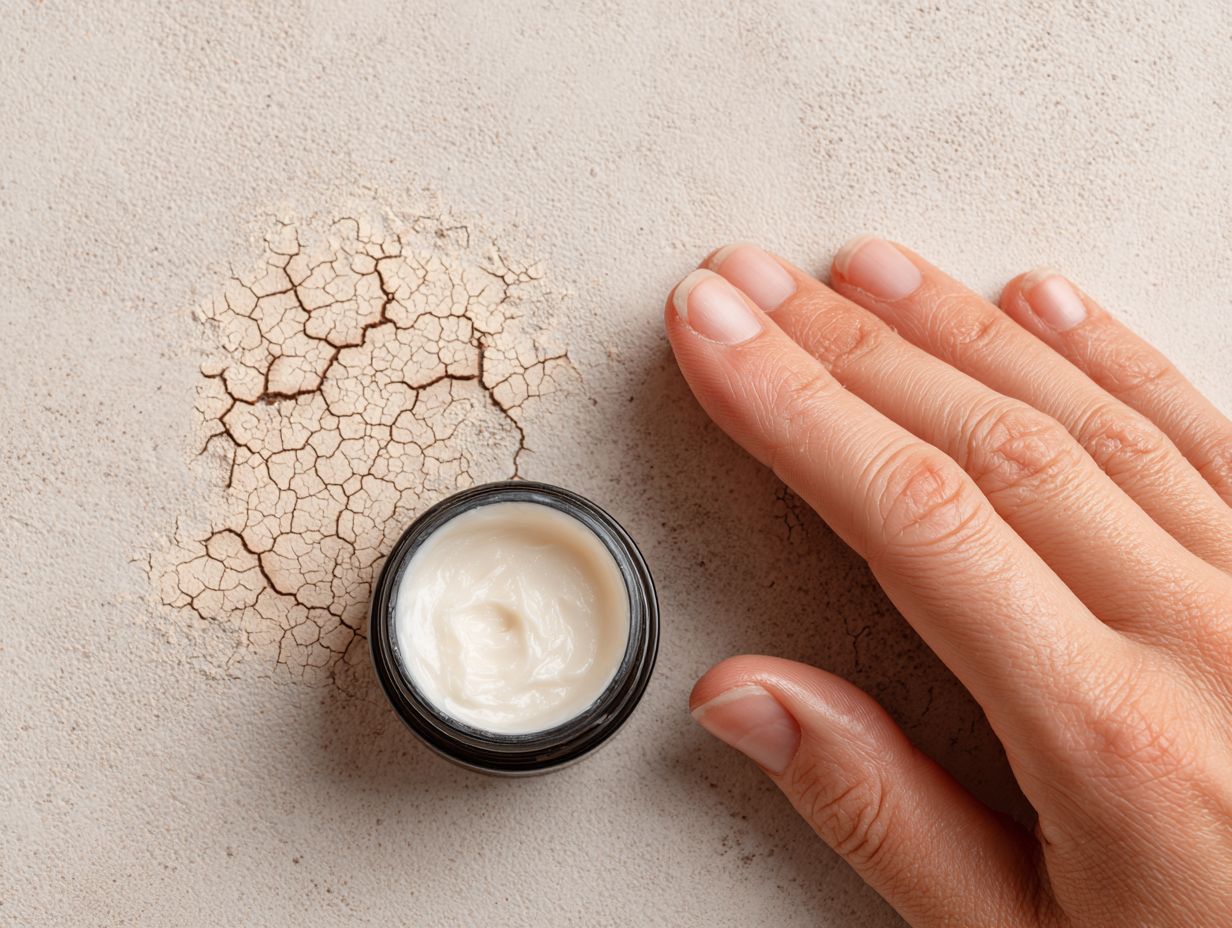
I find that understanding the various causes of skin barrier damage is essential for both prevention and effective treatment.
Environmental Factors
Environmental stressors such as pollution, UV radiation, and extreme weather conditions can significantly impair the function of the skin barrier. To address these challenges, I believe it is essential to incorporate a comprehensive skincare routine, including antioxidants.
I start by using a gentle cleanser to remove pollutants, followed by a hydrating serum that is rich in antioxidants, such as vitamin C. Products like OffCourt are beneficial in this regard. I ensure to apply a broad-spectrum sunscreen with at least SPF 30 daily to protect against UV damage.
During dry seasons, I consider using a humidifier to maintain moisture levels in my skin. For example, products like Neutrogena Hydro Boost Gel Cream are effective in helping to retain hydration.
By following these steps, I can collectively shield my skin, promoting a healthier appearance while minimizing damage from environmental stressors.
Skincare Products
I recognize that certain skincare products, especially those with harsh ingredients or alcohol, can strip the skin of its natural oils, potentially leading to barrier damage. To maintain a healthy skin barrier, I prioritize opting for gentler alternatives, including soap-free cleansers.
I find that soap-free cleansers, such as CeraVe Hydrating Cleanser or Vanicream Gentle Facial Cleanser, effectively cleanse my skin without compromising moisture levels. Additionally, I incorporate moisturizing products rich in ceramides and natural oils, such as The Ordinary’s Natural Moisturizing Factors or First Aid Beauty Ultra Repair Cream. These ingredients are essential for restoring hydration and repairing the skin barrier.
By consistently choosing these types of products, I have observed a significant improvement in my skin’s resilience and overall health.
Lifestyle Choices
I recognize that lifestyle choices, including diet, hydration, and stress management, are essential in maintaining the integrity of the skin barrier.
To enhance skin health, I start by ensuring I drink at least eight 8-ounce glasses of water daily, which helps maintain skin elasticity and prevent dryness. I also focus on incorporating more antioxidants into my diet by including vibrant fruits and vegetables, such as blueberries, spinach, and nuts.
Managing stress is equally important; I engage in techniques like yoga or deep-breathing exercises for at least 10 minutes each day, which can also benefit others experiencing skin conditions. By making these simple changes, I can significantly improve my skin’s appearance and resilience, ultimately leading to a healthier complexion over time.
How to Test Your Skin Barrier
I regularly test my skin barrier to gain insights into its health, which allows me to tailor my skincare routine accordingly.
Patch Testing
I find that patch testing is an effective way to identify allergens and irritants that could compromise my skin barrier, providing valuable insights into my skin’s sensitivity.
To start, I select a range of commonly used products, such as moisturizers, sunscreens, or makeup. I make it a point to test only one product at a time, applying it to a small area of skin, typically on the inner forearm, to monitor for any reactions. It’s essential for me to wait 48 hours after application before assessing for irritation or allergic responses.
I always consult with a dermatologist beforehand to receive personalized guidance and a thorough examination, particularly if I have sensitive skin or any existing conditions. This proactive approach has proven to significantly enhance my skincare routine and minimize the risk of adverse reactions, as dermatologists recommend.
Moisture Retention Test
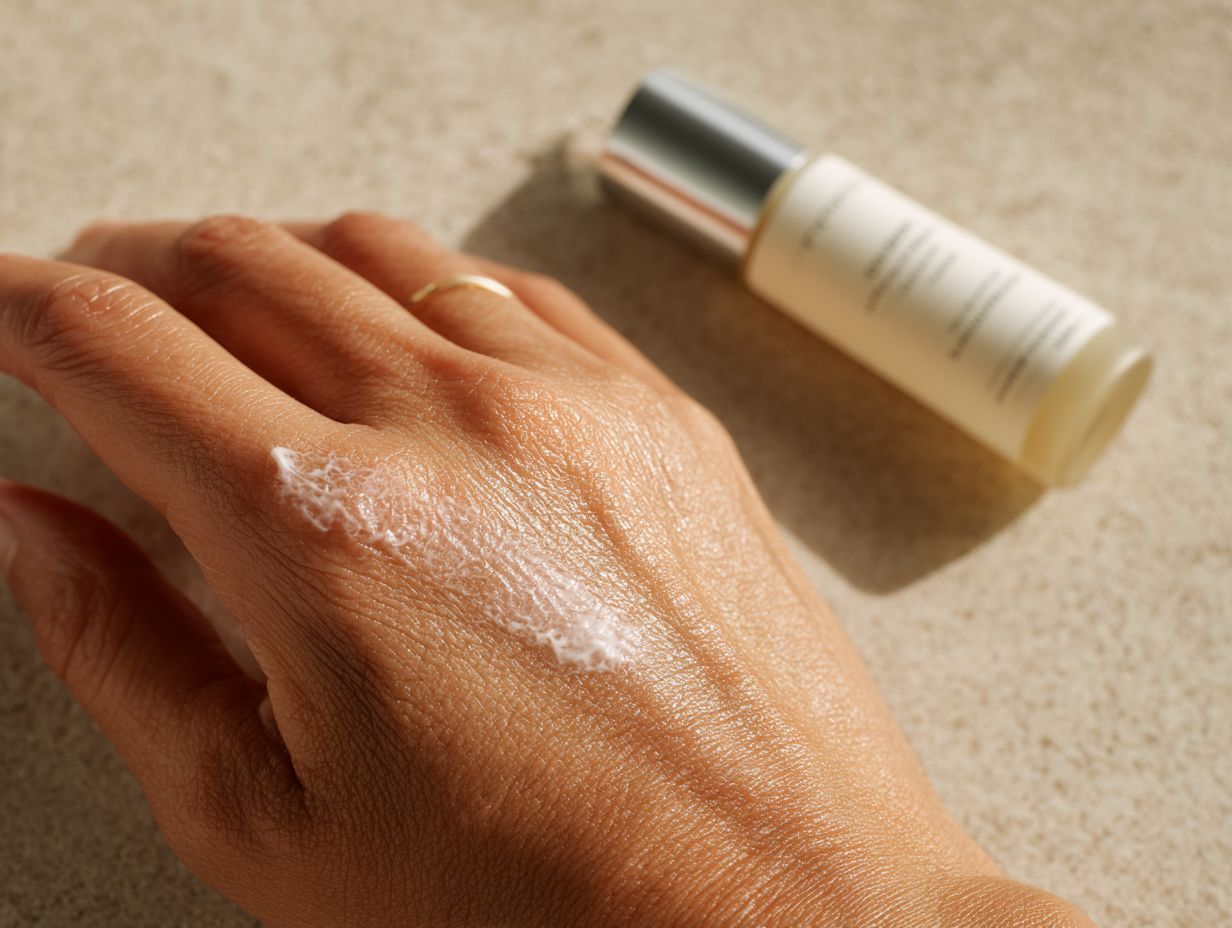
The moisture retention test enables me to evaluate my skin’s ability to maintain hydration, which is a direct indicator of its barrier function.
To conduct a straightforward moisture retention test at home, I begin with a moisture meter. After applying my moisturizer, I take an initial reading and then check again after 24 hours. This process reveals how effectively my skin retains moisture.
Alternatively, I can visually assess my skin’s hydration. After applying the moisturizer, I avoid using any additional products for a full day. I then note how my skin feels in terms of dryness or tightness at various intervals-such as morning, midday, and evening, assessing for collagen and elastin. This qualitative approach assists me in determining which products are most effective for my skin type.
Steps to Repair Your Skin Barrier
Repairing my skin barrier requires a strategic approach that emphasizes hydration, careful product selection, and gentle care.
Hydration and Moisturization
Hydration and moisturization are critical elements in restoring a damaged skin barrier, with specific products playing essential roles in the process. I find that hyaluronic acid is an exceptional hydrating ingredient, capable of holding up to 1,000 times its weight in water.
For effective results, I recommend using The Ordinary’s Hyaluronic Acid 2% + B5, applying it to damp skin to effectively trap moisture. Additionally, I prefer moisturizers that contain ceramides, such as CeraVe Moisturizing Cream, which help reinforce the skin barrier.
It’s beneficial to apply these products twice daily, layering the hyaluronic acid underneath the ceramide creams. This approach not only locks in hydration but also strengthens the skin’s defenses against environmental stressors.
Choosing the Right Products
Selecting the right skincare products that are tailored to my skin type has a significant impact on the health of my skin barrier, as discussed by experts like Melissa Piliang, MD from the Cleveland Clinic. To identify my skin type, I begin by assessing how my skin feels after cleansing.
Normal skin tends to feel balanced, while dry skin may appear flaky, oily skin exhibits a shine, and combination skin presents characteristics of both.
Based on my findings, I choose products that align with my specific skin type. For sensitive or reactive skin, I look for hypoallergenic, fragrance-free options like LOoPHA’s moisturizer. If I have dry skin, I consider using the CeraVe Hydrating Cleanser, which is known for its gentle ingredients.
For oily skin, the Neutrogena Oil-Free Moisture Gel is an excellent choice, as it provides hydration without clogging pores.
I always ensure to patch-test new products to gauge any potential reactions.
Preventing Future Damage
I find that implementing preventative strategies is essential for maintaining a healthy skin barrier and avoiding future damage.
Daily Skincare Routine
Establishing a daily skincare routine that prioritizes hydration and gentle care is crucial for fortifying my skin barrier, integrating practices shared by influencers on TikTok and Instagram. To create an effective regimen, I start each morning with a gentle, soap-free cleanser such as CeraVe Hydrating Cleanser, which helps maintain moisture.
After cleansing, I apply a moisturizer that contains ceramides and fatty acids, like Neutrogena Hydro Boost, to effectively lock in hydration. I also ensure to use sunscreen; a broad-spectrum SPF of 30 or higher, such as La Roche-Posay Anthelios, is essential for protecting my skin.
In the evening, I repeat the cleansing step and follow up with the same moisturizer to nourish my skin overnight. By maintaining consistency in this routine, I can expect to see visible improvements in my skin’s texture and hydration levels.
Protective Measures
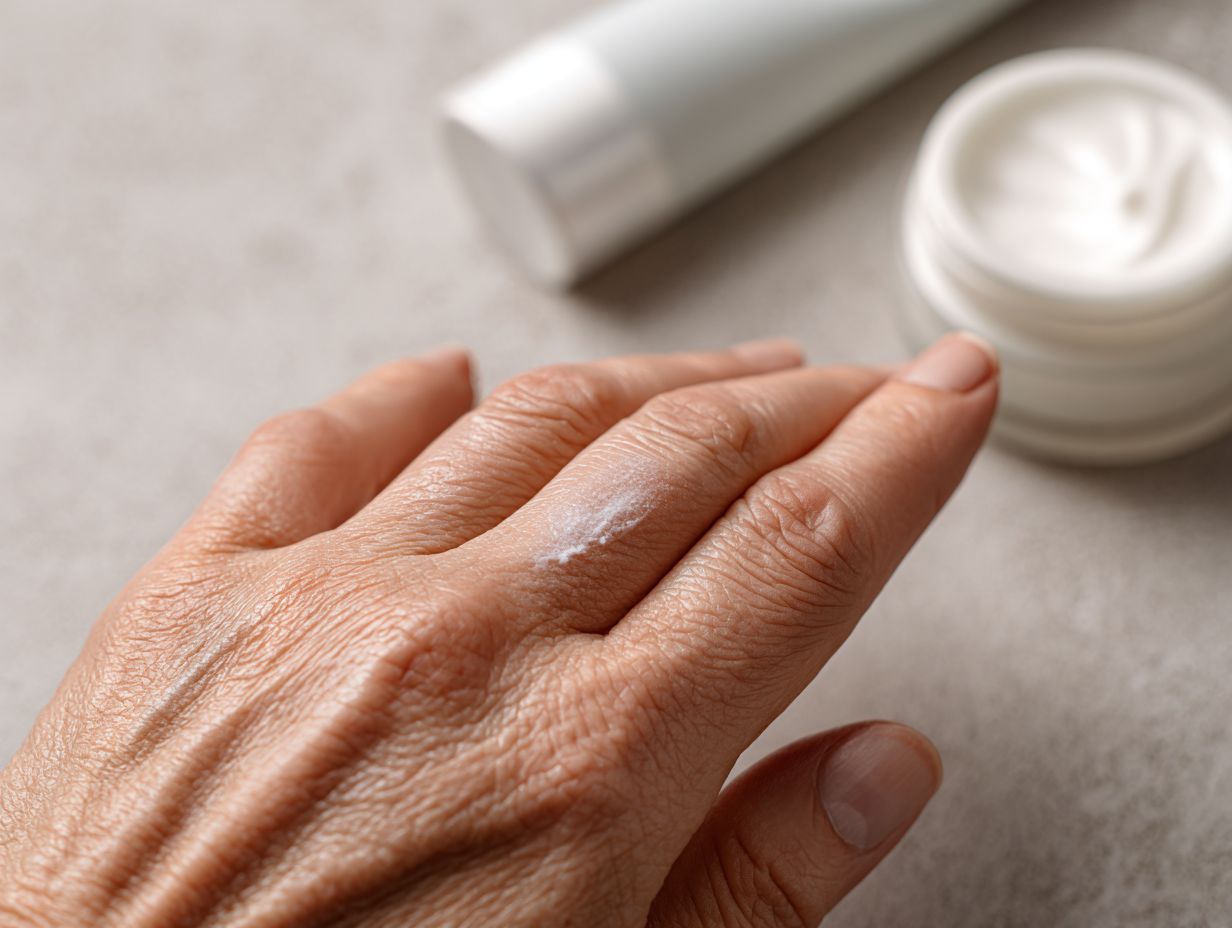
Adopting protective measures against environmental stimuli is essential for maintaining the integrity of my skin barrier. To effectively shield my skin, I begin by applying a broad-spectrum SPF daily, opting for a product with at least SPF 30.
In addition, I incorporate a gentle cleanser into my routine to avoid stripping my skin of its natural oils; for example, I use CeraVe Hydrating Cleanser. I also steer clear of long, hot showers, as they can dry out my skin-choosing shorter, lukewarm baths instead.
In dry climates, I find it beneficial to use an air humidifier to maintain moisture levels in the air, which boosts hydration for my skin, as suggested by the Health Essentials Podcast. I also make it a point to adjust my skincare routine seasonally, layering heavier moisturizers during the winter months to combat dryness while switching to lighter formulations in the summer.
Frequently Asked Questions
1. How can I tell if my skin barrier is damaged?
Signs of a damaged skin barrier may include redness, dryness, flakiness, and increased sensitivity. If you notice these symptoms, it’s a good indication that your skin barrier may be compromised.
2. Can using harsh skincare products damage my skin barrier?
Yes, using harsh or irritating skincare products can strip away the protective layer of your skin, leading to a damaged skin barrier. It’s important to choose gentle and non-irritating products to maintain a healthy skin barrier.
3. How do I repair a damaged skin barrier?
To repair a damaged skin barrier, it’s essential to focus on hydration and nourishment. Look for products that contain ceramides, hyaluronic acid, and fatty acids to help restore the protective layer of your skin and improve its overall health.
4. Can my diet affect my skin barrier?
Discussions on platforms like Reddit highlight the importance of diet.
Yes, a poor diet lacking in essential vitamins and nutrients can contribute to a weakened skin barrier. It’s important to eat a balanced diet with plenty of fruits and vegetables to support healthy skin function.
5. Is it possible to over-exfoliate and damage my skin barrier?
Techniques such as skin exfoliation using alpha hydroxy acid should be used sparingly.
Absolutely, over-exfoliating can strip away the protective layer of your skin and damage your skin barrier. It’s important to limit exfoliation to once or twice a week and choose gentle exfoliants to prevent over-exfoliation.
6. How long does it take for a damaged skin barrier to heal?
The time it takes for a damaged skin barrier to heal can vary depending on the severity of the damage. With proper skincare and nourishment, it can take anywhere from a few days to a few weeks for the barrier to repair itself.


